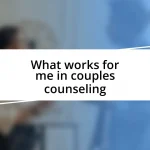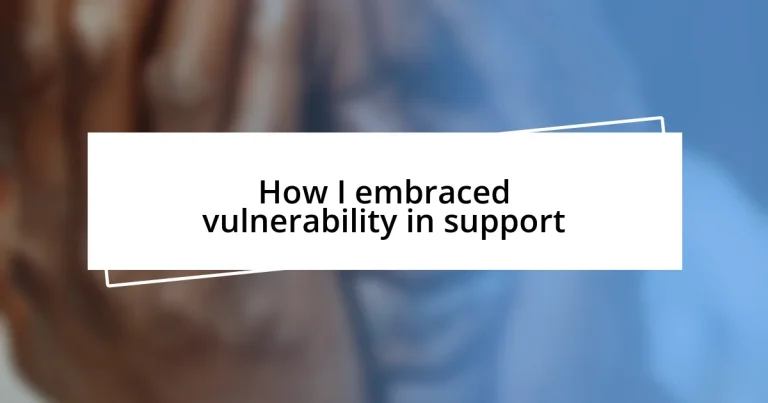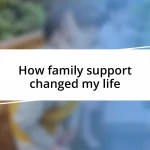Key takeaways:
- Vulnerability is a courageous choice that fosters deeper connections and creates safe spaces for support and healing.
- Embracing vulnerability leads to genuine relationships by inviting empathy and enhancing mental health through shared experiences.
- Effective communication of vulnerability, including choosing the right time and words, encourages reciprocal openness and strengthens trust in relationships.
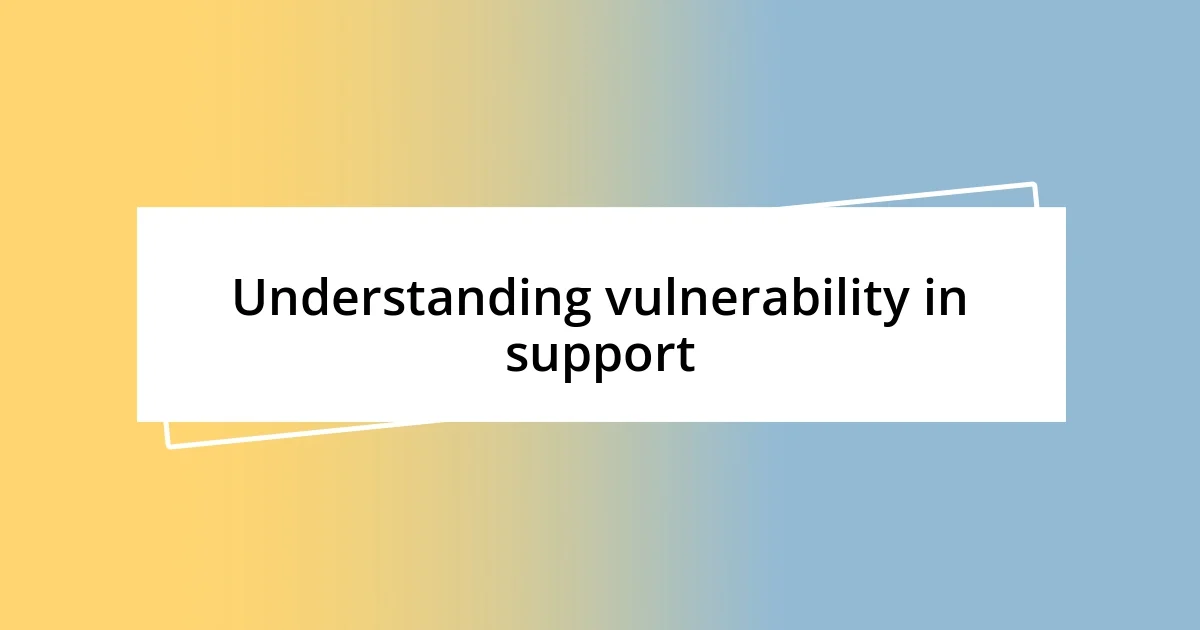
Understanding vulnerability in support
Vulnerability in support is often misunderstood; it’s not about weakness but rather a courageous choice to open ourselves up to others. I remember a time when I hesitated to share my struggles with a close friend, fearful of judgment. But when I finally let my guard down, I was met with empathy and understanding, which deepened our bond significantly. Have you ever felt that fear of being vulnerable? It’s astonishing how revealing our true selves can foster connection and understanding.
When we think of vulnerability, we might picture raw moments of honesty—expressing fears, failures, or even insecurities. I vividly recall a group therapy session where everyone was invited to share their stories. As each person unveiled their struggles, I realized vulnerability wasn’t just sharing pain; it was an invitation for support and healing from those around us. This experience taught me that our vulnerabilities can actually create safe spaces for others to do the same.
Understanding vulnerability in support means recognizing that it can transform relationships. Just last week, I shared my concerns about a personal project with colleagues, and their willingness to listen and offer help was incredibly uplifting. It made me reflect: how would our lives change if we allowed ourselves to be truly seen and heard? Embracing vulnerability can lead to profound support, as it empowers others to connect on a deeper level.
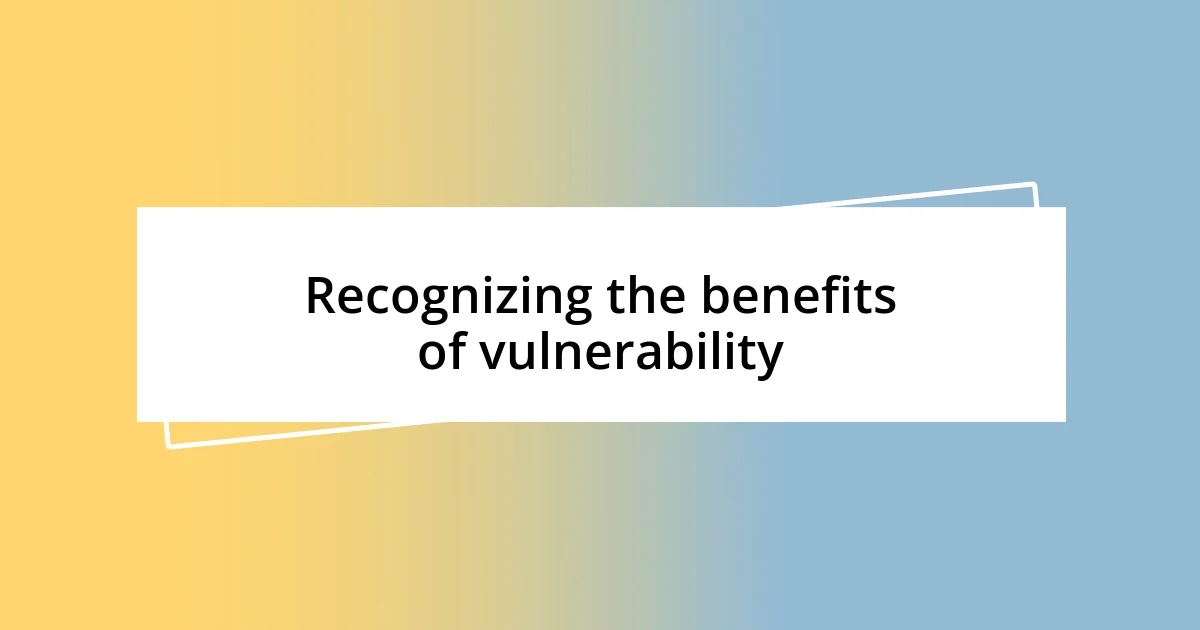
Recognizing the benefits of vulnerability
Vulnerability opens the door to genuine relationships. I recall a moment during a team-building exercise when everyone was tasked with sharing a personal failure. Sharing my own experience of losing a job was daunting. Yet, the collective sigh of relief from my peers showed me that they, too, had faced struggles. This moment of shared vulnerability created an unexpected camaraderie. It highlighted how we can all connect through our imperfections.
When I think about the benefits of embracing vulnerability, I can’t help but reflect on how it invites empathy. A close friend recently confided in me about their battle with anxiety. I was able to listen without judgment because they chose to be vulnerable, allowing me to meet them where they were. This experience taught me that vulnerability isn’t just about sharing one’s own struggles; it’s also about fostering a supportive environment that encourages others to unveil their truths.
Ultimately, recognizing the benefits of vulnerability means understanding its powerful impact on our mental health. I’ve noticed that when I choose to articulate my fears and ask for support, it alleviates my own burdens and creates a shared space for healing. This dynamic is remarkable; the simple act of being open can lighten our emotional load and strengthen our connections with those around us.
| Benefits of Vulnerability | Personal Insights |
|---|---|
| Deepens Relationships | Shared stories can foster bonds that withstand challenges. |
| Invites Empathy | Listening without judgment creates a safe atmosphere for support. |
| Enhances Mental Health | Articulating fears lightens emotional burdens and encourages healing. |
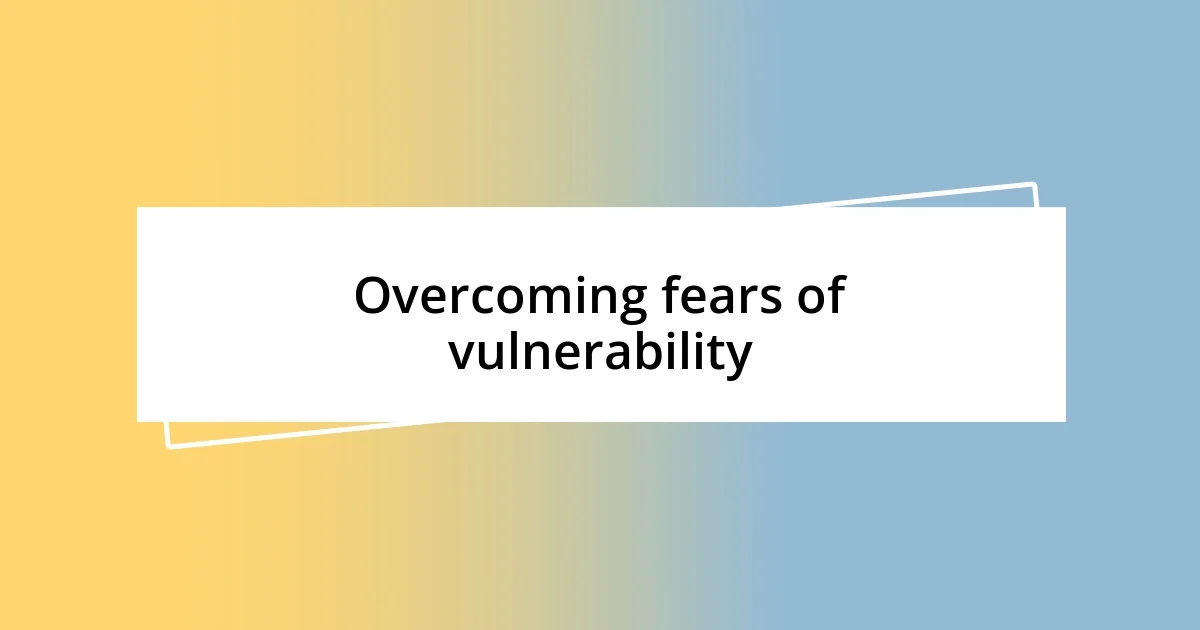
Overcoming fears of vulnerability
I’ve had my fair share of apprehensions when it comes to being vulnerable. There was a particularly challenging time last year when I needed to ask for help in a project I was leading. I remember pacing in my office, the fear of exposing my struggles holding me back. But when I finally voiced my concerns during a team meeting, the atmosphere shifted. My colleagues not only rallied around me but also shared their own challenges. It was a powerful reminder that stepping into vulnerability can often lead to surprising support.
Here are some tips that helped me overcome my fears of vulnerability:
- Start small: Share something minor to build up your courage.
- Choose the right people: Open up to those you trust and feel safe with.
- Reframe your mindset: See vulnerability as a strength rather than a weakness.
- Practice self-compassion: Be kind to yourself about the fears you face and acknowledge them as part of your growth journey.
- Reflect on past experiences: Think about times when vulnerability led to connection and support, reinforcing the positive aspects.
I’ve learned that embracing vulnerability isn’t just about the act itself; it’s about the connections it fosters. One day, feeling especially brave, I decided to share my feelings of inadequacy in a casual conversation with a friend. To my surprise, they echoed similar experiences. This shared exchange made it clear: vulnerability is a two-way street that can bridge gaps and strengthen our ties with others.
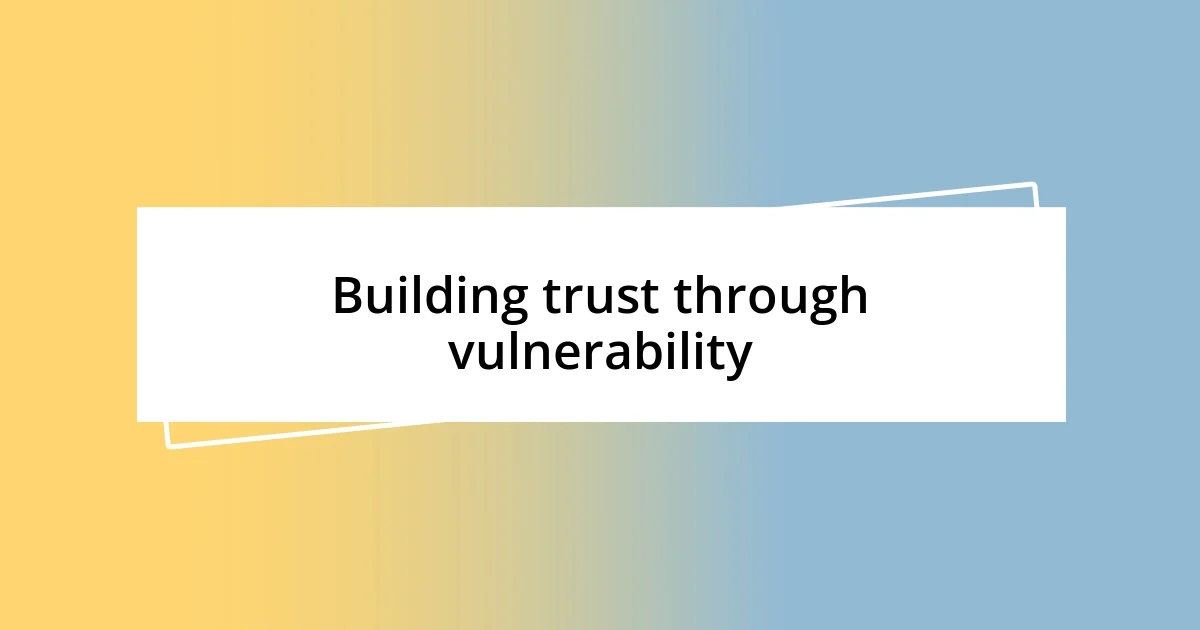
Building trust through vulnerability
When I think about how vulnerability builds trust, a specific moment stands out. During a tough patch in my life, I shared my feelings with a mentor, revealing not just my struggles but also my fears about the future. In return, they opened up about their own challenges, creating a space where both of us were seen and valued. Isn’t it fascinating how showing our bruises can invite others to do the same?
Navigating through our vulnerabilities can feel risky, but I’ve learned that it often strengthens connections in ways I never expected. I once joined a support group where sharing struggles wasn’t just encouraged; it was the foundation of our gatherings. The more we revealed our challenges, the more trust flourished within the group. I often found myself thinking, how can we expect to connect deeply if we’re hiding parts of ourselves?
Reflecting on these experiences, I realize that vulnerability serves as a bridge, linking us to others in profound ways. For instance, after expressing my fears about a career transition, a colleague reached out, sharing their own story of change. This simple act deepened our working relationship and built mutual respect. It’s moments like these that remind me: trust grows in the soil of shared vulnerabilities, and overflowing trust can lead to heartfelt discussions and lasting support.
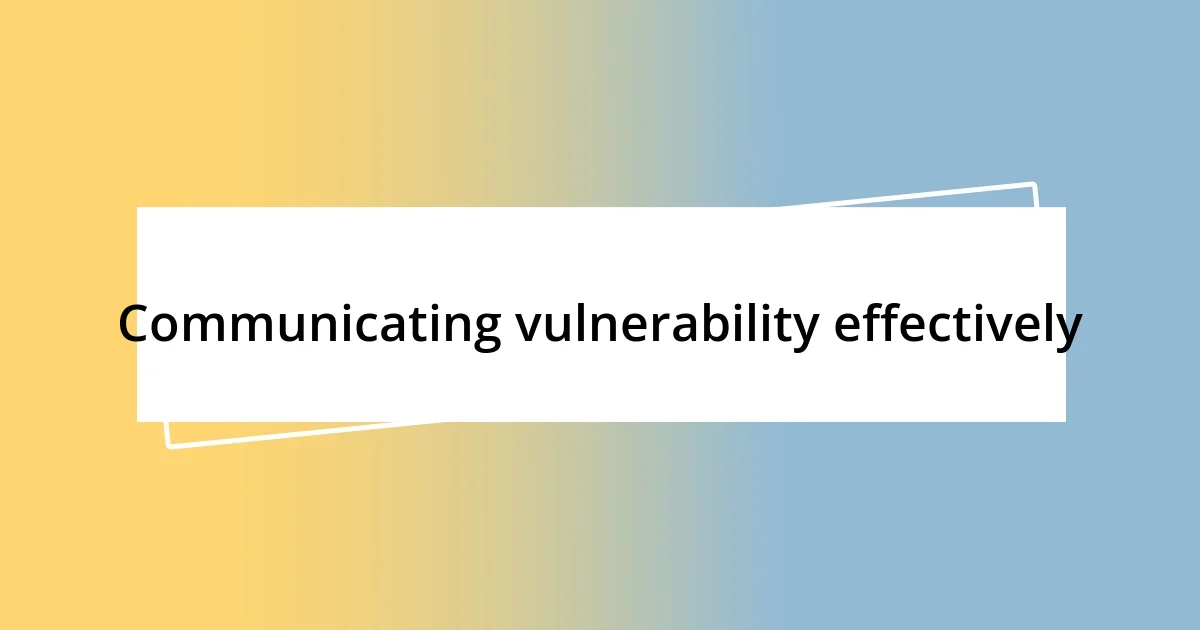
Communicating vulnerability effectively
Communicating vulnerability effectively starts with clarity. I remember a time when I had to express my fears during a larger team presentation. Rather than glossing over my discomfort, I explained how the project weighed on me, and that honesty opened the floor for a genuine discussion. Have you ever noticed how admitting a struggle invites others to share their own? It fosters an atmosphere where everyone feels less alone.
Choosing the right words is equally important. In a particularly tough conversation with a close friend, I chose to say, “I feel overwhelmed and unsure,” instead of just “I’m fine.” The gravity of my situation became clear, and it was like pulling back a curtain on my emotions. I found that when I articulated my struggles effectively, it became easier for them to respond with empathy and support. Isn’t it incredible how such simple expressions can forge deeper connections?
Finally, timing can make a world of difference. During an unexpected life change, I made a point to wait for a quiet moment with my family. Instead of unloading my worries during a hectic dinner, I chose a calm evening. When I finally shared my fears, the response was overwhelmingly supportive. I couldn’t help but marvel at how the setting impacted our discussion. Have you considered how and when you communicate your vulnerabilities? The right timing can turn a tough conversation into a moment of shared understanding.
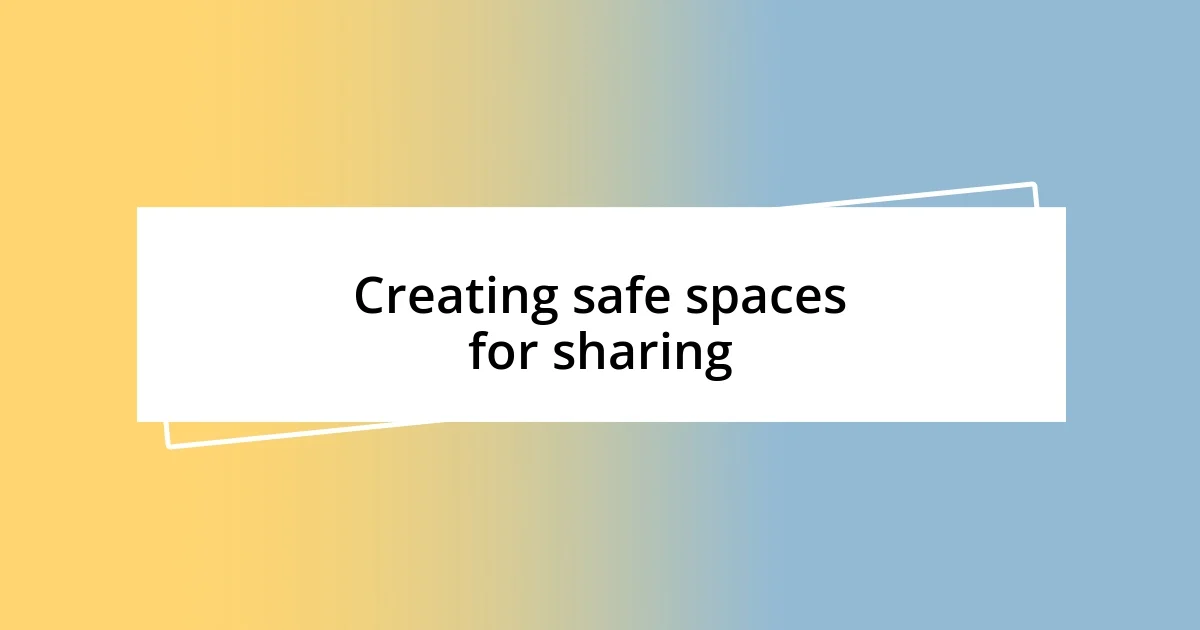
Creating safe spaces for sharing
Creating environments where individuals feel secure enough to share their thoughts and feelings is essential. I recall hosting a small gathering with friends where we intentionally announced, “This space is judgment-free.” As the night unfolded, the air shifted, and people began to share stories they had kept hidden. How remarkable it was to witness that transformation—those unguarded moments became the highlights of the evening, demonstrating the power of safety in vulnerability.
It’s also important to acknowledge that vulnerability can be met with apprehension. One day, while leading a team workshop, I shared my own struggles with imposter syndrome. The room was initially quiet, and I could sense the tension. But after I opened up, others started to share their fears too, revealing just how common those feelings were. I often wonder: what if I hadn’t taken that first step? It’s a reminder that creating safe spaces often starts with one brave voice.
Listening actively enhances these safe spaces even more. I remember a conversation with a coworker who faced personal challenges. Instead of jumping in with advice, I simply listened. I nodded and mirrored their emotions, which granted them the freedom to express themselves fully. How rewarding it felt to see the relief on their face! Isn’t it astonishing how attentive listening can create an atmosphere where sharing becomes not just possible, but natural?
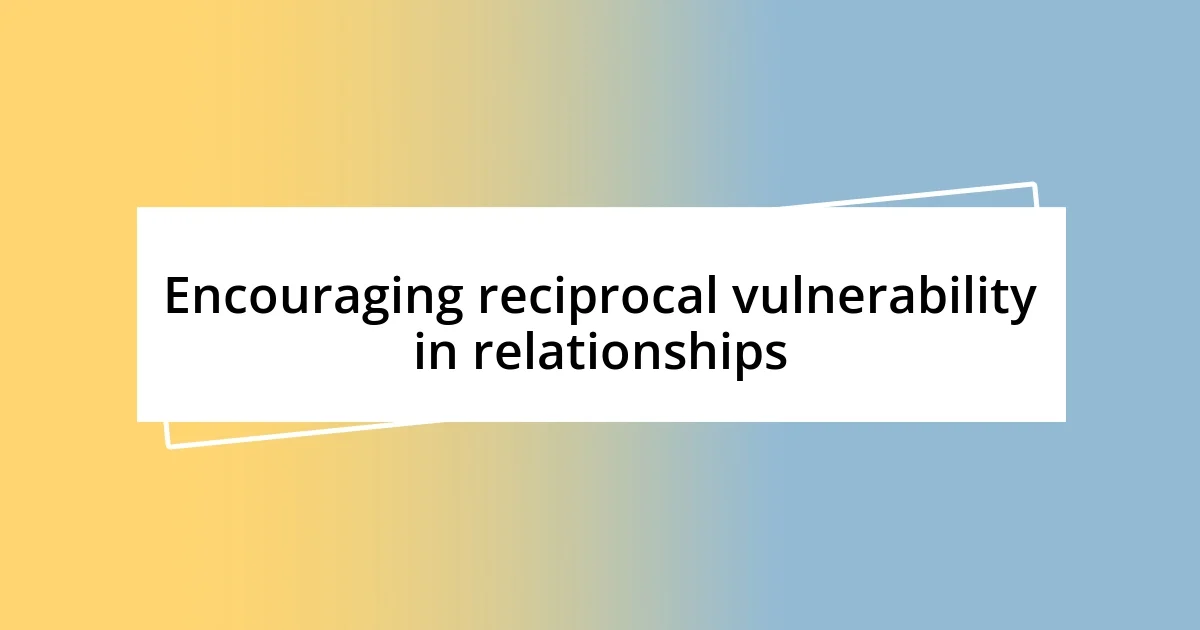
Encouraging reciprocal vulnerability in relationships
Reciprocal vulnerability is like a dance—it requires both partners to step forward. I vividly recall a heart-to-heart with my partner when I shared my fears around our future. She responded with her own uncertainties about career choices. In that moment, I realized how our shared honesty not only deepened our connection but also built trust. Have you ever felt that relief when someone reciprocates your vulnerability?
It’s fascinating how vulnerability can ripple through relationships, generating a cycle of emotional openness. One time, during a family gathering, I took a leap and discussed my mental health struggles over dinner. In response, my sibling opened up about their similar feelings. It struck me how breaking down my walls encouraged them to do the same. Isn’t it wonderful how one act of vulnerability can transform the tone of a conversation?
Encouraging vulnerability also means actively cultivating a supportive response when others share. I remember a coworker who once hesitated to express their concerns about a project. When they finally spoke up, I made sure to validate their feelings by saying, “I appreciate you sharing that; it really resonates with me.” Their relief was palpable, and it prompted a more honest dialogue. What do you think happens in relationships when we prioritize validation? It creates a mutual space for sharing, reinforcing bonds and comfort in opening up.


